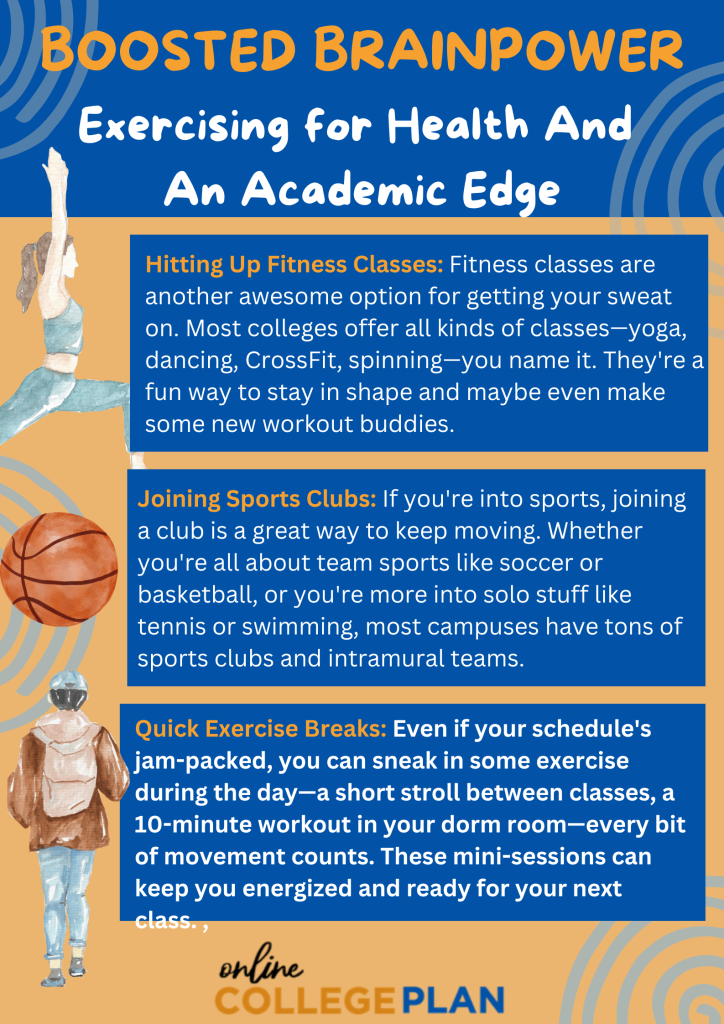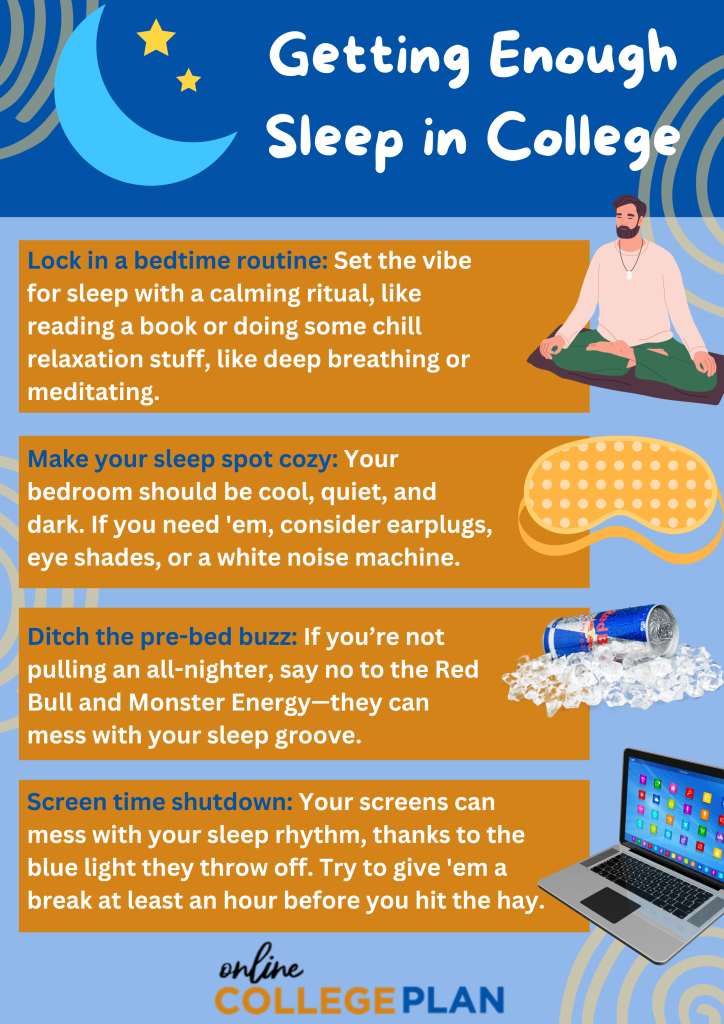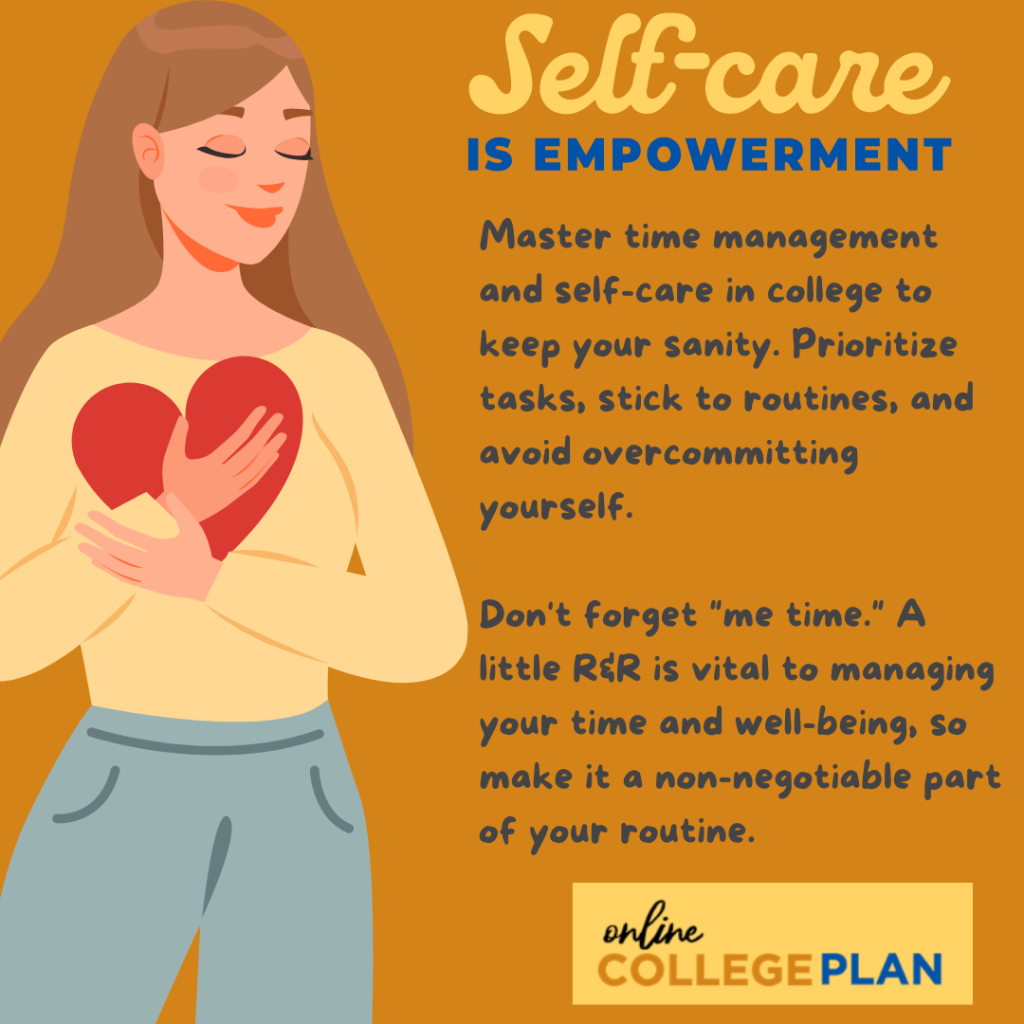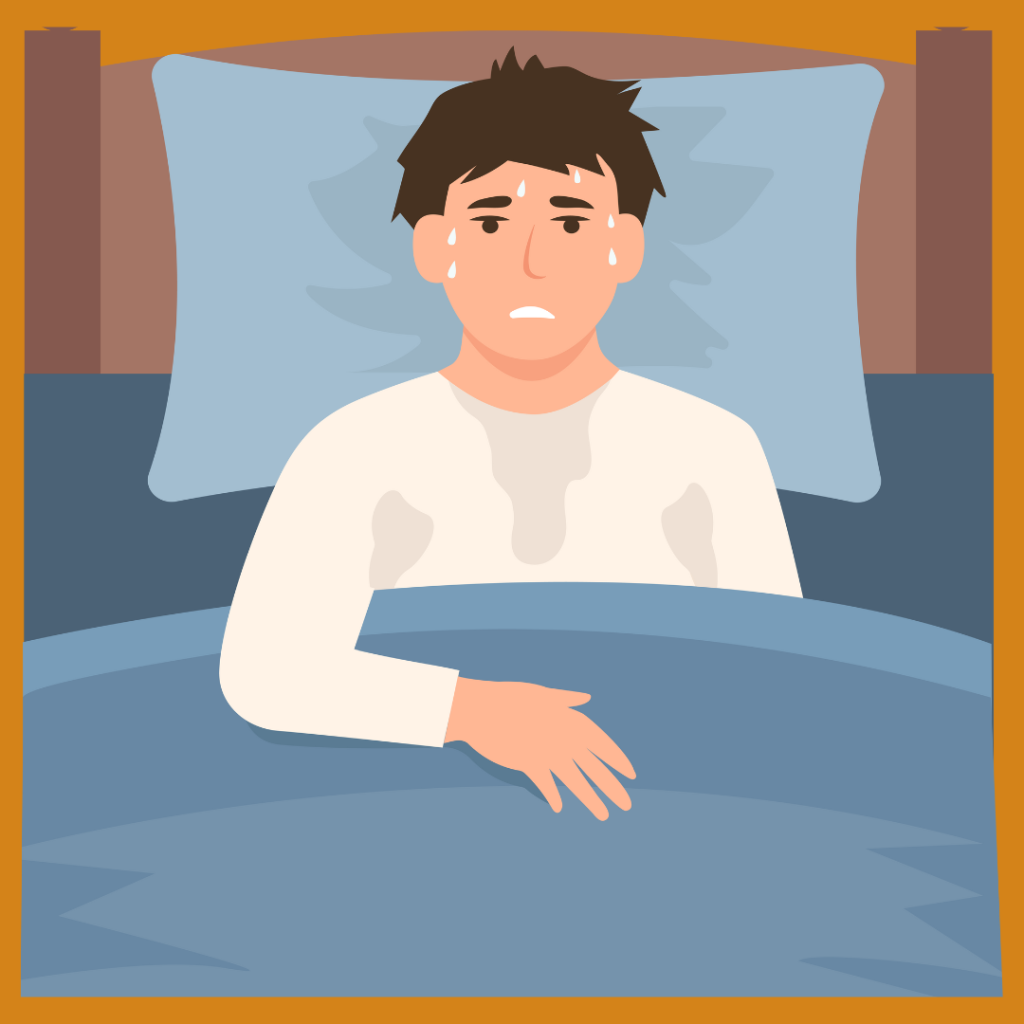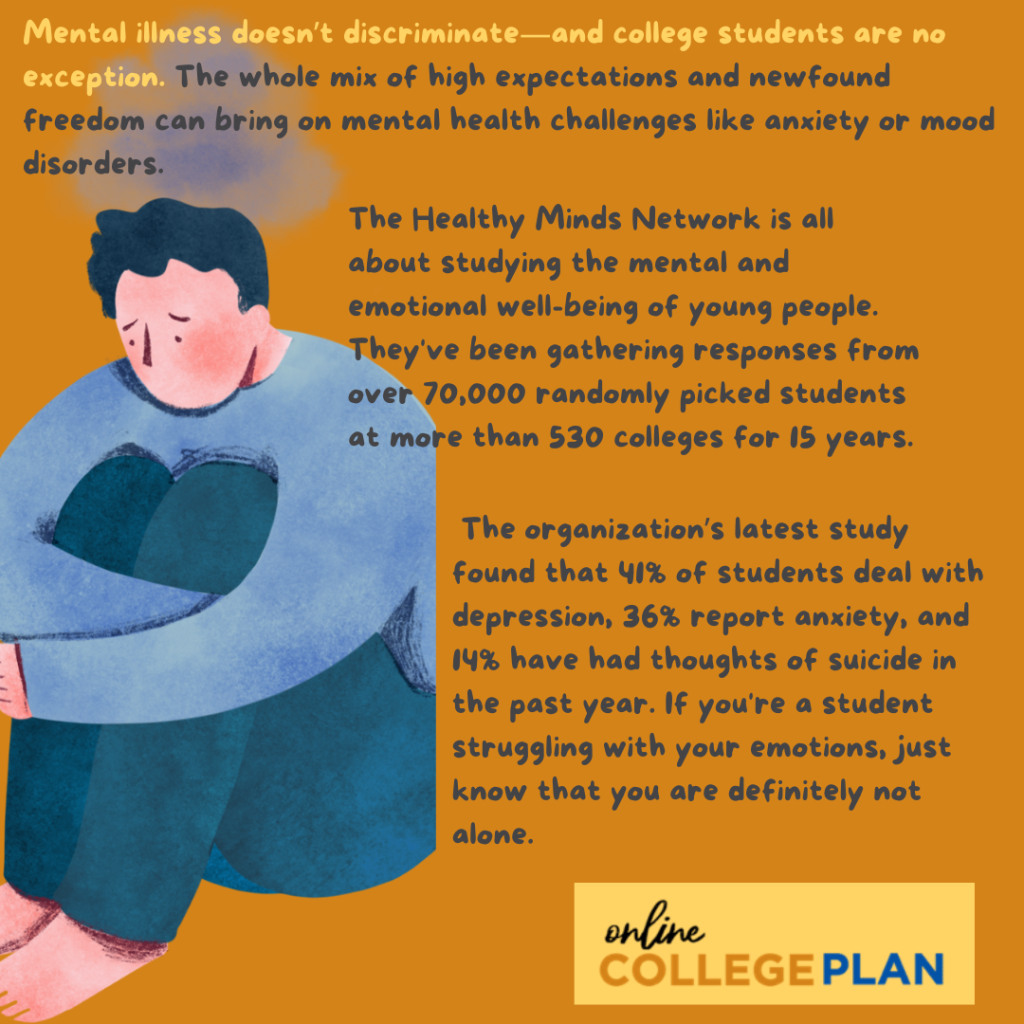Staying Healthy in College: An Easy Guide for Physical and Mental Well-Being
Find your degree

Welcome to college! It’s a time of new experiences, exciting opportunities, and a whole lot of learning. But there’s more to it than hitting the books and making lifelong friends. You may also find yourself navigating a minefield for your health amidst the chaos. Having peak physical and mental health in college can be a real challenge. Think late-night study sessions versus early morning classes. Junk food binges against the backdrop of tight budgets. And let’s not even start on the social pressure cooker.
Sure, some students thrive under these conditions. Their Instagram feeds are a testament to an endless stream of ‘good vibes.’ But behind those filtered snapshots lies another truth—a significant number struggle silently with fatigue and stress levels that could rival any CEO’s.
If you’ve been feeling overwhelmed, burnt out, or more tired than usual, you’re probably nodding along right now. The stakes are high; we’re talking about more than just grades here. The struggle of maintaining wellness in college is real. But it’s also critical to your overall success. This is all about prioritizing the most crucial thing you’ve got—your health and well-being.
So, how do you keep your body and mind in check while maintaining a college life balance?
Let’s break it down with a simple guide to hook you up with some great student health tips for college. We’ll chat about setting up good habits like regular exercise and picking the right foods. But we’ll also focus on some novel ways to handle stress, get enough sleep, and find the help you need if things get to be too much. We hope you find this guide on maintaining your physical and mental health in college extremely useful!
Related Resource: Emotional Intelligence in College: Tips for Success
Fueling Your Brain: Smart Strategies for Healthy Eating in College
Eating healthy in college? Sounds like an oxymoron with all those tempting food trucks parked right outside your dorm. You already know that eating well is crucial for maintaining good health in general. But a healthy diet in college is even more important, since what you eat directly impacts how you feel and perform academically.
One cannot think well, love well, sleep well, if one has not dined well.
Virginia Woolf
Hey, we get it—juggling academics, new responsibilities, and a social life can make it tough to focus on healthy eating. But with a bit of planning, you can keep your body fueled for success. Check out these easy tips for making smart food choices on campus:
College Cuisine: Map Out Your Meals for Student Success
Planning out your meals can help you make better choices and ensure you’ve got the good stuff on hand. If you will be cooking your own meals, make a little time each week to map out what you’ll eat and snack on. Think about your upcoming schedule to figure out what foods will keep you going all day. And hey, making a grocery list based on your plan can help you dodge impulse buys and save some cash.
Dining Hall Dilemmas: Mastering Mindful Eating on Campus
When you hit up the dining hall, you might be ravenous. But take some time to scope out all the options before loading up your plate. Look for fresh, colorful fruits and veggies, lean proteins, and whole grains. Go for the grilled or baked options instead of the fried stuff, and keep an eye on portion sizes so you don’t overdo it. Stick to water or unsweetened drinks instead of sugary sodas. And remember, eat just until you’re satisfied. This way, you won’t be using food as a stress buster.
Snack Smarter: A College Student’s Secret Weapon for Energy and Focus
Snacks are more important for college students than you might think. They keep you fueled up during those long days of classes and study sessions. They help you stay focused, prevent the dreaded hangry scenario, and give you the additional nutrients you need to power through. Remember to pack healthy snacks with you for your busiest days on campus. Having them on hand can help you dodge the temptation of hitting up the vending machine for less-than-healthy options.
Sweat Smart: Elevating Your College Experience Through Exercise
We’ve all heard it – exercise is good for you. It keeps your body in tip-top shape, so you stay healthy, sleep better, and gain an overall sense of well-being. So why do we put it off? Thomas Frank (College Info Geek) says, “As students who are busy and who are young, we make a couple of really fiendish excuses in our lives when it comes to exercising.” In this video, he talks about those excuses and how to squash them for good. Plus, Frank gives some terrific pointers on fitting exercise into your already full schedule.
Physical fitness is not just good for your health and vitality. It’s like the secret sauce that will give you an edge in other aspects of life at college. And once you get started, you’ll be hooked. Exercise is one of the best ways to maintain your physical and mental health in college. Here’s what you can expect when you start working up a sweat:
Sharper Memory: Working up a sweat releases brain proteins that amp up your memory and brain power. So, when you’re hitting the books or listening to a lecture, all that exercise means you’ll soak up info like a sponge.
Super Concentration: When you get moving, blood flows to your brain, revving up your neurons and sparking new brain cell growth. Just 20 minutes of exercise before a study session can dial up your focus and help you nail that learning.
Feel-Good Vibes: Exercise cranks up your endorphins, those awesome ‘feel-good’ chemicals that calm anxiety and boost your mood. So, when things get overwhelming, a dose of regular exercise can keep stress in check.
Turbocharged Energy: Staying physically fit is a secret weapon for acing your studies. Exercise gives your energy levels a boost, perfect for those marathon study sessions. Plus, it heightens your sense of creativity, so your next big idea might just be a walk or jog away.
Physical fitness is not only one of the most important keys to a healthy body, it is the basis of dynamic and creative intellectual activity.
John F. Kennedy
There’s no one right way to stay fit in college, so look for ways to stay active that you actually enjoy. If you hate group classes, for example, cross Zumba off your list—you’ll never be motivated enough to stick with it anyway. Instead, explore activities that excite you, like hiking, ice skating, or rock climbing. Let’s explore some cool ways to stay active during your college years.
Rise and Shine: Mastering the Art of Sleep in College
Of all the tips we’ve listed, getting enough shuteye is one of the most essential things you can do for your physical and mental health in college. But between your newfound freedom, extracurricular activities, and vibrant social life, it’s easy to neglect your sleep patterns. There are so many new and exciting things to do. Who has time for sleep?
And let’s not forget the demands of coursework. Pulling an all-nighter might be tempting before finals week kicks off. However, a lack of quality sleep can significantly impact your physical and mental health and your ability to concentrate and retain information.
Proper rest is so important for college students that Harvard even began requiring incoming freshmen to take a course called Sleep 101. Cornell has a similar course called Refresh.
Sleep is the single most effective thing you can do to reset your brain and body.
Matthew Walker, Ph.D., Professor of Neuroscience and Psychology UC Berkely
Sleeping well helps consolidate memory (hello, better grades) and keeps mood swings at bay. Nobody wants to be grumpy during group projects, right? Establishing a sleep routine isn’t easy with varying class schedules but try to aim for 7-8 hours each night.
The Benefits of Quality Sleep for College Students
Quality sleep positively impacts several aspects of your college life. Here are a few key benefits:
- Improved cognitive function: Getting enough shut-eye amplifies your memory, focus, and brainpower, making you a total academic rockstar.
- Enhanced mood and emotional well-being: When you catch your Zzzs, you ease crankiness and anxiety and give your mental health an upgrade. As Jojo Jensens said, “Without enough sleep, we all become tall two-year-olds.”
- Boosted immune system: Score enough sleep, and you’ll beef up your immune system, lower your chances of getting sick, and speed up any recovery time.
- Increased energy and productivity: A good night’s sleep supercharges your energy and focus, so you have enough steam to power through your assignments and fun activities.
Don’t forget – making sleep a priority is a big part of keeping your college game strong. Getting into good sleep habits is all about recharging and crushing it in every way – academically, physically, and mentally.
Here are some chill ways to upgrade your snooze schedule so you can stay on point:
Cracking the Code: Time Management Tips for College Life Balance
College life is a juggling act, balancing academics, social life, and maybe even a job. You know that feeling when you’ve got so much on your plate that you don’t even know where to start? Yeah, college can feel like that—a lot. Here’s the thing, though: time management isn’t just about getting to class on time; it’s about keeping your sanity intact, too.
Good time management skills can seriously prevent you from feeling frazzled and keep your daily tasks organized and efficient. Grab a pocket calendar or, even better, download a college planning app to sort out your stuff and figure out what needs to happen and when. Break any big tasks into smaller bites so you don’t get overwhelmed. Then, handle things one at a time. Sticking to a consistent schedule means that assignments and other responsibilities won’t pile up. And that helps to keep the pressure from becoming too intense.
Right now, you might feel like a chef in a kitchen with too many orders to fill, pots boiling over, and ingredients scattered everywhere. But with the right strategies in place, it’s totally doable. Here are a few tips that can help:
Lock in Your Schedule: Time management apps for students are total game-changers. They’ll help you stay on top of homework and important dates without any stress. There are plenty of options, so finding one that works for you should be a piece of cake.
Stick to Your Routines: A solid routine can bring some order to the chaos of college life. Whether it’s setting aside time for studying, meal prep, fitness, or relaxation, routines are where it’s at.
Get Your Priorities Straight: Everything feels urgent in college, so you’ll need to figure out what’s actually pressing and what you can put on the back burner for now.
Hint: To determine whether something is urgent or can wait, consider what will happen if you don’t do it now. If there’s a big, time-sensitive deal or major consequences, it’s probably urgent. If not, you can likely push it back a bit.
Balancing the Pressures of College Life With Self-Care
Speaking of priorities, let’s not forget about setting aside some time for yourself.
We often forget this one crucial fact – we’re human. Feeling overwhelmed is part of the package deal called “life.” So here are two self-care tips worth their weight in gold:
- Say no sometimes—it’s liberating.
- Treat yourself as kindly as you would treat a dear friend going through tough times.
“Me time” isn’t selfish; it’s necessary to have some recharge time—whether that’s taking bubble baths or simply sitting quietly doing nothing (yes, doing nothing now and then is quite alright). If you’re unsure where to start, make a list of activities that bring you joy and relaxation. Here are a few ideas to get you started:
- Hang out with friends and loved ones.
- Take a nap.
- Pursue some of your favorite hobbies or creative interests.
- Read a book just for the fun of it.
- Listen to music.
- Spend time in nature.
- Write a letter.
- Go for a walk.
- Get a manicure.
- Watch a movie.
Feeling Under the Weather? How to Handle Getting Sick at College
When you’re away at college for the first time, you’re also away from the watchful eyes of your parents. And let’s be real. That’s pretty exhilarating. Unless, of course, you get sick.
Back home, Mom or Dad would spot the signs of you feeling off and step in to take care of you, but now it’s all on you. You might not even notice your own physical cues and symptoms since you aren’t used to listening to your body without a parent’s guidance. As a result, you could easily ignore your signs and symptoms until you’re seriously ill and have no clue what to do. It can be pretty scary and unsettling, so it’s vital to be ready for getting sick at college.
Outsmarting the Freshman Flu
Freshman flu is a collective term for a bunch of symptoms students often get during their first few weeks of school. It’s not limited to freshmen. And it’s not any one particular virus. Instead, it’s a combination of illnesses likely caused by putting a large group of students from all over the world together in one place.
Freshman flu is annual. When you go from being in your community bubble to suddenly living with thousands of people all from random other places, odds are that at least one of them will be carrying a strain of common cold that you’re not immune to yet. It usually rampages through campus the first few weeks.
OuroborosMaia- Student from the r/UMD Community on Reddit
Typically in the first few weeks, everyone gets sick. Between living packed into the dorms, community bathrooms, parties, etc., if one person is sick it means everyone’s going to get sick. When I worked in reslife I always got a cold within the first 3 weeks of the semester, dorms are germ factories!
Apatheticpolliwog- Student from the R/College Community on Reddit
In addition to being in close quarters with a whole bunch of new people, you’re also adjusting to a whole new routine, maybe not getting as much sleep as you should, and probably not eating that great. And let’s be honest here—the partying doesn’t help either. All of these things can weaken your immune system and make you an easy target for illness.
What to Do if You Get Sick at College
Whether it’s the freshman flu, a bad cold, or some other ailment, pretty much every college newbie will deal with being sick at some point. So, if you do end up feeling under the weather, what’s the game plan?
Be Prepared
Before heading off to college, it’s a good idea to pack some basic first aid stuff and over-the-counter meds. If you haven’t done this yet, now is a good time to do so. If it’s not in your budget, give this list to all those family members and friends who keep asking, “Is there anything you need?” Here are a few handy items to have on hand:
- A little first aid kit with bandages, antiseptic wipes, and tweezers.
- Pain relievers like acetaminophen or ibuprofen for headaches and muscle aches.
- Allergy meds for any sniffles or reactions.
- Cough drops for a sore throat.
- A thermometer to keep an eye on your temp.
- Something for indigestion and heartburn.
- Maybe some anti-diarrheal meds, just in case.
- Cold and flu meds for when you’re feeling under the weather.
- Itch relief cream for rashes and bug bites.
One thing overlooked when prepping to live in a dorm is medicine for colds, flu, coughs, diarrhea, etc. You need a fully stocked medicine cabinet/bag because Mom and Dad won’t be there to run to the store for you.
GotHeem16-Student from the r/Applying to College Community on Reddit

Seek Out Campus Health and Wellness Resources
The second thing you should do is familiarize yourself with your school’s health resources. Most colleges and universities offer healthcare tailored to the needs of their students. Whether it’s a pesky cold or something more serious, getting medical help on campus should be your first step. College health services are open to all students and offer everything from regular check-ups to urgent care.
The campus clinic is your go-to spot for healthcare. It’s usually conveniently located right on or near campus for easy access. You might need to schedule an appointment ahead of time, but some clinics also take walk-ins. Others will even do video appointments. It’s smart to know the clinic’s phone number so you can get the care you need when you need it. Utilizing this resource whenever needed is a great way to take control of your physical and mental health in college.
Know the Signs of Illness
As we discussed earlier, listening to your body is key to recognizing the signs of illness. Common things to watch out for include:
- Excessive fatigue or lack of energy that can’t be explained by other causes.
- Respiratory Issues like shortness of breath, coughing, or wheezing.
- Gastrointestinal distress, including nausea, vomiting, diarrhea, or constipation.
- Pain and discomfort such as persistent or severe headaches, body aches, sore throat, or abdominal pain.
- A fever usually indicates you’re fighting an infection. A body temperature above 100.4 degrees Fahrenheit is considered a fever. For a temperature over 102.2. you should reach out to your doctor.

Nursing Yourself Back to Health
Sick at school? One of the first things you might miss is your Mom’s TLC, but that’s totally normal. Never fear; part of being an adult is learning how to self-soothe and nurture yourself. The steps for getting well when you’re sick are pretty similar to what we’ve discussed about staying healthy:
| Rest and prioritize sleep | Get plenty of sleep and take it easy. Your body needs time to bounce back, and sleep is how you heal. |
| Stay hydrated | Drink plenty of fluids, such as water, juices, and ginger ale, to stay hydrated and support your recovery. Popsicles, Jello, and non-caffeinated sports drinks are also helpful. |
| Manage your medications | Take any prescribed medications as directed by your healthcare provider and seek clarification if needed. Even if you’re feeling better, don’t stop your medicines unless the doctor tells you to. |
| Practice good hygiene | Wash your hands frequently, cover your mouth and nose when coughing or sneezing, and maintain cleanliness in your surroundings. |
| Seek support from friends and family | Ask your friends or roommates for help, whether it’s grabbing groceries or just hanging out with you. And call or text your mom for some virtual comfort. |
| Maintain a balanced diet | Consume healthy foods to give your body fuel for recovery. But take it easy. Try to munch on easy-on-the-tummy stuff like soups, crackers, and toast |
Mastering Your Mental Health in College
College really throws a lot at you at once: the academic pressure, getting used to a new scene, and being responsible for yourself for the first time. It’s such a fun new experience that it’s easy to forget the toll it can take on your stress levels. That’s why this final section on keeping up with your physical and mental health in college may just be the most important.
Let’s have a frank discussion about staying on top of your mental health.
First, you need to understand when ordinary stress morphs into something heavier. That’s crucial. Because if you don’t, it can snowball quickly. But how can you tell? Does your heart race at the mere mention of an assignment? Do you panic over getting to class on time? Maybe you’ve been having nightmares, insomnia, or a lack of appetite. Some other tell-tale signs include being more irritable than normal, trouble concentrating or feeling overwhelmed by things that used to be no biggie.
If you’re experiencing any of the above symptoms (or your pals are noticing them), you might be dealing with more than just typical college jitters.
What Is Good Mental Health and Wellness?
We all know those people who seem to be able to handle life’s ups and downs with ease. They manage to sail through life without any major hiccups. The fact is, some people were just born with better coping skills than others. And that’s perfectly okay. Good mental health is all about finding that sweet spot where your mind is sharp, your emotions are in check, and you’re vibing well with the people around you. Most people experience stress to some degree. But you can be the smartest student on campus and still be lacking in emotional IQ. It’s not your fault. It’s just a combination of your genetic makeup, life experiences, and personality.
Coping with Stress and Anxiety: Mental Health Care Tips for College Students
Look. Mental illness is no joke. It’s a huge deal for anyone. In our stressful and fast-paced society, it strikes people from all walks of life, including college students. If you’re struggling, be open and real about your challenges. There is absolutely no shame in seeking out support. In fact, it demonstrates your strength and willingness to care for yourself. Here are a few options:
Campus Counseling Centers
Most colleges have counseling services where you can book one-on-one sessions, join group therapy, or take part in workshops on handling stress and building coping skills. If you’re studying remotely, you can often schedule these sessions through video calls.
Online Therapy and Telehealth Services
Speaking of online services, if you prefer remote options or need flexible scheduling, platforms like Better Help, Talkspace, and Charlie Health offer counseling sessions you can access from anywhere. Be sure to check with your insurance company to see what’s covered. Many insurance companies offer such services for free.
Peer Support and Student Organizations
Joining groups focused on mental health can give you a sense of community and understanding. Check out organizations like Active Minds for peer support and changing the mental health conversation on campus.
Mental Health Apps and Self-Help Tools
There are tons of free apps and online tools for managing mental health in college. A few options include:
Faculty and Staff Support
More college faculty members than ever are being trained to help support students who are struggling with mental health issues. Reach out to your professors and college staff for guidance.
Frequently Asked Questions About Being Healthy in College
Stay hydrated by drinking plenty of water and limiting soda and energy drinks. Partying, especially when it involves excessive alcohol consumption and drug use, can really impact your health and academic performance. So, practice moderation. Eat healthy foods and get plenty of exercise to stay performing at your best.
Wash your hands regularly and carry hand sanitizer. Get vaccinated, especially for flu and other common campus illnesses. Be mindful of shared surfaces in public areas and clean them before use.
Adequate sleep improves memory, concentration, and overall academic performance. Sleep supports your emotional regulation and can prevent mood swings. It also helps maintain a healthy immune system, reducing the risk of illness.
Create a comfortable sleep environment and use eye masks and earplugs when necessary. Limit your screen time before bed. This will help you avoid the stimulating effects of blue light. Finally, establish a bedtime routine to signal your body it’s time to wind down.
Practice meditation and deep breathing techniques to calm your mind. Engage in hobbies and activities that make you happy. Stay in touch with your support network, such as friends, family, and close classmates. If you’re feeling overwhelmed, emotional, or unusually stressed, seek support from campus counseling services.
Every bit of movement helps. For example, walk or bike to class instead of driving or taking the bus, or take the stairs instead of the elevator. You can also try high-intensity interval training (HIIT) workouts. These can be found online and only take 20-30 minutes. Finally, practicing yoga will help you fit in two healthy habits simultaneously, since it helps maintain both your physical and mental health.
Plan your meals ahead of time and consider meal prepping on weekends. At the dining hall, choose healthier options, such as salads and grilled proteins. And don’t skip meals. This will only lead to overeating later on.
Try to eat a balanced diet with fruits, vegetables, lean proteins, and whole grains. But if you find yourself too busy for meals, be sure to fit in plenty of snacks. Keep nuts, berries, fruits, yogurt, and hard-boiled eggs on hand to munch on between classes.


